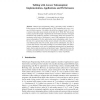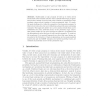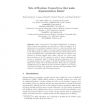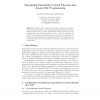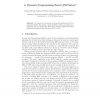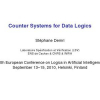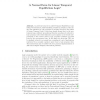143
click to vote
JELIA
2010
Springer
15 years 11 hour ago
2010
Springer
Tabled Logic Programming (TLP) is becoming widely available in Prolog systems, but most implementations of TLP implement only answer variance in which an answer A is added to the t...
124
click to vote
JELIA
2010
Springer
15 years 11 hour ago
2010
Springer
In the field of non-monotonic logics, the notion of rational closure is acknowledged as a landmark, and we are going to see that such a construction can be characterised by means o...
126
Voted
JELIA
2010
Springer
15 years 16 days ago
2010
Springer
Stable belief sets were introduced by R. Stalnaker in the early ’80s, as a formal representation of the epistemic state for an ideal introspective agent. This notion motivated M...
115
click to vote
JELIA
2010
Springer
15 years 16 days ago
2010
Springer
Traditionally, a logic program is built up to reason about atomic first-order formulas. The key idea of parametrized logic programming is that, instead of atomic first-order form...
149
click to vote
JELIA
2010
Springer
15 years 16 days ago
2010
Springer
Abstract. Many proposals for logic-based formalizations of argumentation consider an argument as a pair (Φ, α), where the support Φ is understood as a minimal consistent subset ...
134
click to vote
JELIA
2010
Springer
15 years 16 days ago
2010
Springer
Abstract. Nonmonotonic causal logic became a basis for the semantics of several expressive action languages. Norman McCain and Paolo Ferraris showed how to embed propositional caus...
112
Voted
JELIA
2010
Springer
15 years 16 days ago
2010
Springer
Abstract. We present a novel system for propositional Answer-Set Programming (ASP). This system, called dynASP, is based on dynamic programming and thus significantly differs fro...
JELIA
2010
Springer
15 years 16 days ago
2010
Springer
146
click to vote
JELIA
2010
Springer
15 years 16 days ago
2010
Springer
In previous work, the so-called Temporal Equilibrium Logic (TEL) was introduced. This formalism provides an extension of the Answer Set semantics for logic programs to arbirary the...
